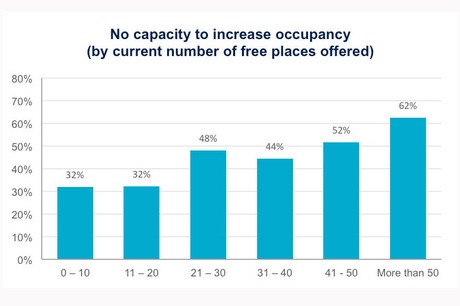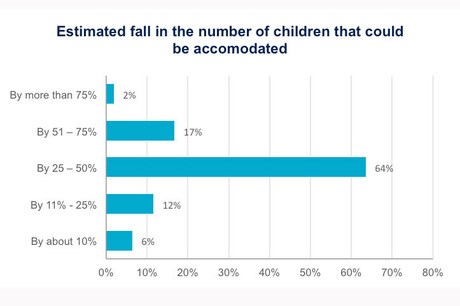School nurseries warn 30-hours will force them to take fewer children
Tuesday, September 8, 2015
Most primary schools are already subsidising free nursery places from the rest of their budget and fear that doubling the entitlement will force them to cut pupil numbers, a new survey of head teachers suggests.

Two-thirds of schools believe they would need to cut the number of children they take to offer 30 hours of free childcare.
The research from head teachers' union NAHT reveals that 80 per cent of schools are already subsidising childcare places from the rest of the schools budget, with a further 12 per cent cross-subsidising the cost of funded places from paid-for nursery funding.
The majority of respondents (58 per cent) reported that they did not receive sufficient funding to cover the cost of three- and four-year-old places, rising to 70 per cent for those funded at less than £4 an hour (accounting for 39 per cent of schools.)
Just under a quarter of schools were offering places for twos (23 per cent), with the majority of these offering fewer than 20 places. Of these, 62 per cent said that the funding did not cover the cost of the places.
Only 15 per cent of school-based early years providers believe the extension to the funded hours is sustainable under the current plans.
An early years place for all: the NAHT Childcare Bill report, also reveals that many schools simply do not have the physical space to extend the funded hours.

More than half of respondents (54 per cent) said they did not have the capacity to increase the number of funded hours they offered, while 19 per cent said they were not sure.
However, just under half of schools surveyed said that they could increase capacity if capital funding were available to them.
If the 30 hours were applied to children currently in their setting, the majority of schools (63.53 per cent) thought it would reduce the number of children they could accommodate.

Nearly 800 nursery classes, nursery schools and nurseries on school sites took part in the survey. The overwhelming majority of responses were from schools with a nursery setting in a primary or infant school, and more than nine in ten of respondents offered term-time only provision.
Russell Hobby, NAHT general secretary said the union supported the aspiration but warned that without proper funding and consultation with providers families could lose out.
‘Many of our members have been telling us for some time that they are running their nurseries at a loss, subsidising them from their regular budget at a level that is not sustainable in the long term,’ he said. ‘The Government has to work with us to make sure that the policy becomes one that schools can actually deliver.’
The NAHT makes four key recommendations:
- capital funding is key to the success of the 30-hours;
- a national fair funding formula for nursery education should be developed;
- the DfE also needs to work with the sector to understand the issue of capacity and consider how to make sure there is enough provision to meet demand;
- schools will also need time to implement the policy, particularly if they have to reduce the number of children they currently support.
Early years sector organisations said the findings reinforced their own concerns about under-funding and the potential impact of the 30-hour plans.
Neil Leitch, chief executive of the Pre-school Learning Alliance, said providers had been forced to find other ways to cover the cost of places for many years.
‘For maintained settings, this often means raiding the rest of the schools budget, as highlighted in this report; for PVI providers, it has meant minimal wages and an over-reliance on fundraising and the work of volunteers to stay afloat. And across the board, childcare costs for additional hours have inevitably risen as providers struggle to plug the growing funding gap. Clearly, this cannot continue.
‘It’s vital that Government resists the temptation to rush out a policy that, while attractive on the surface, is simply unworkable in its current form.’
He added, ‘The Department for Education has often said that it wants a school-led early years system, and yet even schools aren’t being adequately funded. It’s clear that this is not just a PVI problem; it’s a sector-wide problem. Government must now commit to making fundamental changes to the early years funding system that ensure that all providers are fairly funded, not just today but in the long term.’
Liz Bayram, chief executive of the Professional Association for Childcare and Early Years, said the findings chimed with PACEY’s own research.
‘We wholly support the NAHT’s recommendations,' she said. 'But it is not just about funding. We are also calling for the Government to implement a comprehensive workforce strategy that supports childcare professionals across all settings. A highly incentivised and trained workforce lies at the heart of giving children from all backgrounds the best start in life.’
Commenting on the report, Purnima Tanuku, chief executive of the National Day Nurseries Association (NDNA), said, 'Here is another organisation raising the same concerns on the delivery of the Government’s pledge to expand childcare that we and other early years representatives, as well as the House of Lords Select Committee on Affordable Childcare, have been voicing since before the general election.
'Schools are worried about receiving sufficient funding to make expansion of free hours for three- and four-year-olds sustainable. So is the private, voluntary and independent nursery sector. The Government will need all types of childcare providers to step up to the challenge of providing more funded places if they are to meet parents’ expectations.'
She added that it was 'a great opportunity' for schools and private and voluntary nurseries to work together.
'Private nurseries are experienced in providing flexible, all-day childcare and education to young children whereas many schools already have enough on their plates with rising numbers of primary-age pupils,' she said.
The NDNA estimates that 190,000 existing, spare places in PVI nurseries could be 'unlocked' if the Government put in place a fair funding package for nurseries.












